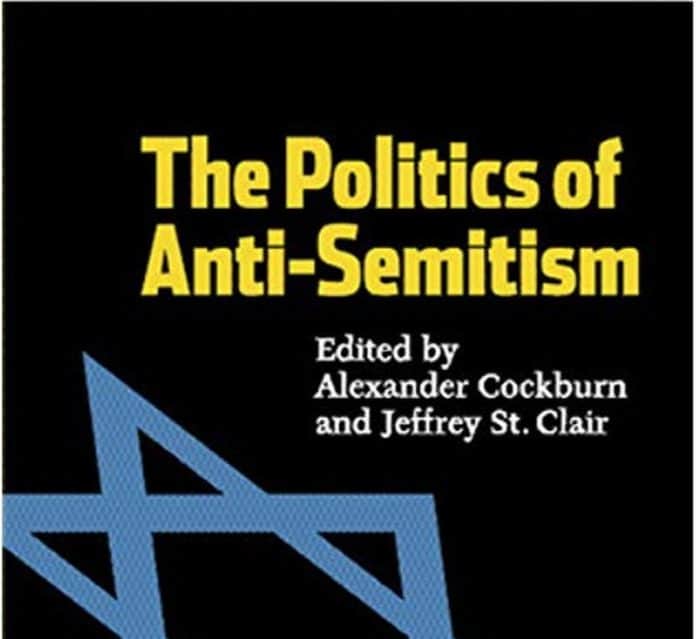The book The Polititics of Anti-Semitism was published in october 10, 2003 by CounterPunch and AK Press. We found the subject to be important and searched all the articles on the internet and compiled this collection of articles and supplied with some reviews.
Content
Compilers Foreword

We find the question of seperating Anti-Zionism and Anti-Semitism so important, that we have compiled this 2. online edition of all the contributions in this heavy anthology on the subject.
Our main purpose is to contribute to the situation and ongoing suffering of the Palestinian people, even now 60 years after the foundation of the Zionist settler state Israel.
At the buttom of Contents we have compiled a few selected reviews of the book.
Compiled by Bjarne A. Frandsen & Jørgen Lund
Modkraft.dk/Tidsskriftcentret (Copenhagen, Denmark)
2. ed., April 2008, updated May 2019 (Socialistisk Bibliotek)
See also:
- Antisemitisme: Den rigtige definition og den forkerte. Af Rohini Hensman Socialistisk Information, 5. december 2023)
“Og hvorfor vi må bekæmpe både antisemitisme og zionisme… ’Antisemitisme’ er det ord, der normalt bliver brugt om racisme imod jøder, hvis vi definerer ’racisme’ meget bredt som undertrykkelse af enhver gruppe mennesker på grund af fysiske karakteristika (som f.eks. hudfarve), sprog, religion, kaste, stamme, eller herkomst.” - The challenge of antisemitism. By Anna Gluckstein (International Socialism, Issue 180, Autumn 2023)
“… we should not allow the lines separating the Israeli state and Jews as an ethnic group to become blurred. The left should resist and challenge anything that further blurs this distinction.” -
Ny Jerusalem-deklaration om antisemitisme kan blive et nyttigt redskab til forsvar for ytringsfriheden om Palæstina (Socialistisk Information, 8. maj 2021)
“IHRA-deklarationen om anti-semitisme fra 2016 har skabt forvirring og skabt konflikter, er uklar på nøglespørgsmål og helt åben for forskellige fortolkninger, og på den måde har den svækket kampen mod antisemitisme.” - Antisemitism and the far-right today. By Rob Ferguson (International Socialism, Issue 154, Spring 2017)
“First, I wish to argue that we face a growing threat of antisemitism from the right … Second, I aim to examine the charge that a ‘new antisemitism’ has emerged on the left and among Muslims. Finally, I want to address the extent and character of antisemitism in the Middle East and among Muslim communities and how socialists should respond.” - On Israel and Anti-Semitism: A reading list. By Rowan Wilson (Verso, Blog, 5 May 2016) “Below is a Verso reading list on the history of the Israeli-Palestinian conflict and the politics of anti-Zionism.”
- ZNet’s Anti-Semitism Debates (ZNet/Internet Archive, 2003-04)
“ZNet has collected some of the discussions on anti-semitism; some writers’ responses to charges of anti-semitism; and some reactions and context.”
See at Socialist Library:
- Subject overview: Palestine / Israel
- Linkbox: Zionisme – Antizionisme: Historien om racisme og etnisk fordrivelse
- Linkbox: The Israel Lobby and US foreign policy
Introduction
“How did a term, once used accurately to describe the most virulent evil, become a charge flung at the mildest critic of Israel, particularly concerning its atrocious treatment of Palestinians? Edited by Cockburn and St. Clair, the print and online journal Counterpunch has become a must read for hundreds of thousands a month who no longer believe anything they read in the mainstream press beyond the sports scores. And on the subject of Israel and Palestine, of the Israel lobby in the US, the current middle east crisis, and its ramifications at home and abroad, Counterpunch has been unrivalled. Herein you’ll find 18 of the finest essays and articles (from 9 Jews and 9 Gentiles!). A lot of the names will be familiar – Edward Said, Robert Fisk, Norman Finkelstein, Lenni Brenner, Uri Avnery, plus the editors. Then, there’s former CIA analysts Bill and Kathy Christison, the trenchant and witty philosopher Michael Neumann, seasoned Capitol Hill staffer George Sutherland, Will Yeoman’s path-breaking essay on Israel and divestment, Shaheed Alam who became a target of the fanatical Daniel Pipes and Israeli journalist Yigal Bronner. Plus Kurt Nimmo, Bruce Jackson, Jeffrey Blankfort and more. This, the first in the new Counterpunch series from AK Press, is a timely anthology on how silence and complicity in crimes against a betrayed people has been enforced.”
Contents:
Michael Neumann: What is Anti-Semitism? (p. 1-12)
“Inflating the meaning of ‘antisemitism’ to include anything politically damaging to Israel is a double-edged sword. It may be handy for smiting your enemies, but the problem is that definitional inflation, like any inflation, cheapens the currency.”
Michael Neumann is a professor of philosophy at Trent University in Ontario, Canada.
Scott Handleman: Trivializing Jew-hatred (p. 13-19)
“Partisans of Israel often make false accusations of anti-Semitism to silence Israel’s critics. The ‘antisemite!’ libel is harmful not only because it censors debate about Israel’s racism and human rights abuses, but because it trivializes the ugly history of Jew-hatred.”
Scott Handleman is studying law at Boalt, at the University of California, Berkeley.
Alexander Cockburn: My life as an ‘Anti-Semite’ (p. 21-38)
“The real problem is most Jews here just don’t like hearing bad things said about Israel, same way they don’t like reading articles about the Jewish lobby here. Mention the lobby and someone will rush into print saying ‘Cockburn toys with the old anti-Semitic canard that the Jews control the press’.”
Alexander Cockburn is coeditor of CounterPunch.
Lenni Brenner: Anti-Semitism, old and new (p. 39-41)
“Zionists never stop proclaiming that they represent ‘the Jews.’ Is it strange that some ignorant Muslims believe them and equate Judaism with Zionism?”
Lenni Brenner is author of Zionism in the Age of the Dictators.
Uri Avnery: Manufacturing Anti-Semites (p. 43-47)
“The State of Israel is causing the resurrection of anti-Semitism all over the world, threatening Jews everywhere. The Sharon government is a giant laboratory for the growing of the anti-Semitism virus.”
Uri Avnery is an Israeli journalist, peace activist and former Knesset member.
Linda Belanger: Word’s hurt, but tanks kill: putting accusations of Anti-Semitism in context (p. 49-51)
“… one is made to feel that Jews are more victimized than other groups or that anti-Semitism is somehow more abhorrent than other forms of racism.”
Bruce Jackson: Jews like us (p. 53-57)
“It’s weird and freaky when militant right-wing Jews can hook up with old-fashioned anti-Semites to stereotype the rest of us, but these are weird and freaky times.”
Bruce Jackson is SUNY Distinguished Professor and Samuel P. Capen Professor of American Culture at University of Buffalo.
Robert Fisk: Why does Malkovich want to kill me? (p. 59-62)
“In 26 years in the Middle East, I have never read so many vile and intimidating messages addressed to me. Many now demand my death. And last week, the Hollywood actor John Malkovich did just that, telling the Cambridge Union that he would like to shoot me.”
Robert Fisk reports on the Middle East for the London Independent.
Kurt Nimmo: Poetry as treason? (p. 63-67)
“It seems you not only have to be careful what you say, as White House spokesman Ari Fleischer warned last year, but also what you write, especially if you are an African-American poet with a Muslim name and Marxist politics.”
Kurt Nimmo is a photographer and multimedia developer in Las Cruces, New Mexico.
Will Youmans: The divestmen campaign (p. 69-72)
“What bewilders me is that so many critics attack viciously the critical singling out of Israel by the divestment campaign, but are actively supportive of singling out Israel as a special ally and worthy recipient of disproportionately high arms, aid, and trade.”
Will Youmans is a third year law student at UC-Berkeley.
M. Shahid Alam: A new technology of power (p. 73-77)
“Over the past year, however, I began to cross that thin line which I should have known one crosses only at some peril. I began to talk and write about Israel. None of this would have been newsworthy if I had been reading from the script; but I was not. Instead, I began calling a spade a spade. In other words, I was stepping over the line.”
M. Shahid Alam is Professor of Economics at Northeastern University, Boston.
Norman Finkelstein: Counterfeit courage: reflections on “Political Correctness” in Germany (p. 79-83)
“The challenge in Germany today is to defend the memory of the Nazi holocaust and to condemn its abuse by American Jewish elites; to defend Jews from malice and to condemn their overwhelmingly blind support for Israel’s brutal occupation.”
Norman Finkelstein is the author of The Holocaust Industry and Image and Reality in the Israel-Palestine Conflict.
Jeffrey St. Clair: Rockets, napalm, torpedoes, and lies: Israel’s attack on the Liberty, revisited (p. 85-97)
“In early June of 1967, at the onset of the Six Day War, the Pentagon sent the USS Liberty from Spain into international waters off the coast of Gaza to monitor the progress of Israel’s attack on the Arab states. The Liberty was a lightly armed surveillance ship. Only hours after the Liberty arrived it was spotted by the Israeli military.”
Jeffrey St. Clair is coeditor of CounterPunch.
Jeffrey Blankfort: The Israel lobby and the left (p. 99-117)
“That there is a meeting of the minds on this issue between supporters of Israel and the Left may help explain why the Palestine support movement within the United States has been an utter failure.”
Jeffrey Blankfort is former editor of the Middle East Labor Bulletin and has written extensively on the Israel-Palestine conflict.
George Sunderland: Our Vichy congress (p. 119-126)
“A Congressional staffer details Israel’s stranglehold on Capitol Hill.”
George Sunderland is the pen name of a Congressional staff member.
Kathleen and Bill Christison: The Bush Administration’s dual loyalties (p. 127-143)
“The issue we are dealing with in the Bush administration is dual loyalties-the double allegiance of those myriad officials at high and middle levels who cannot distinguish U.S. interests from Israeli interests, who baldly promote the supposed identity of interests between the United States and Israel, who spent their early careers giving policy advice to right-wing Israeli governments and now give the identical advice to a right-wing U.S. government.”
Kathleen Christison worked for 16 years as a political analyst with the CIA. Bill Christison joined the CIA in 1950, and served on the analysis side of the Agency for 28 years.
Yigal Bronner: A journey to Beit Jalla (p. 145-149)
“The people of the village Beit Jalla have been under curfew for the last month, with no end in sight. Now, for the first time in several days, the curfew has been lifted for a few hours, allowing them to stock up supplies (not that the shops in the village have much to offer).”
Yigal Bronner is a member of Ta’ayush – Arab-Jewish Partnership.
Edward Said: Dignity, solidarity and the penal colony (p. 151-172)
“In fact, I cannot think of any other country on earth that, in full view of nightly TV audiences, has performed such miracles of detailed sadism against an entire society and gotten away with it.”
Edward Said is a professor at Columbia University.
Reviews
Gilles d’Aymery: The Politics of Anti-Semitism:
Part 1: Smear, slander, and intimidation (Swans, April 26, 2004)
Part 2: Stereotypes and other canards (May 10, 2004)
“Cockburn and St. Clair assembled a series of, for the most part, brilliant and incisive essays superbly written by a variety of thoughtful authors … Wide spread anti-Semitism and anti-Semitism baiting are properly debunked; the Israeli repressive policies against the Palestinians lucidly tackled, showing that contrary to the line propagated by Officialdom Jewish Americans are far from forming a monolithic, pro-Israel block; and, the case is made, albeit less convincingly, on the influence of Israel and US Jewish organizations on official Washington (which will be explored in Part II of this review).”
Hadas Thier: Zionism and Anti-Semitism: Are Israel’s critics Anti-Semites? (International Socialist Review, Issue 38, November-December 2004)
“There are a couple of mistaken responses to the confusion (which Zionists have been careful to sow) about the relationship between anti-Zionism and anti-Semitism. One is to completely dismiss anti-Semitism as altogether irrelevant. A pretty outrageous example of this is Michael Neuman’s essay in The Politics of Anti-Semitism where he argues, ‘I think we should almost never take anti-Semitism seriously, and maybe we should have some fun with it’ … Besides showing a complete disdain for anyone who might be genuinely worried about anti-Semitism, Neuman also shows a total misunderstanding of the nature and character of anti-Semitism and how it has been used historically.”


















![A demonstration of workers from the Putilov plant in Petrograd (modern day St. Peterburg), Russia, during the February Revolution. The left banner reads (misspelt) "Feed [plural imperative] the children of the defenders of the motherland"; the right banner, "Increase payments to the soldiers' families - defenders of freedom and world peace". Both refer to the economic toll the First World War was having on civilian life, February 1917 (probably around March 7 [O.S. February 22]) Photo: Unknown. Public Domain.](https://socbib.dk/wp-content/uploads/2007/04/1917-februarrevolution2.1500x0-218x150.jpg)















![A demonstration of workers from the Putilov plant in Petrograd (modern day St. Peterburg), Russia, during the February Revolution. The left banner reads (misspelt) "Feed [plural imperative] the children of the defenders of the motherland"; the right banner, "Increase payments to the soldiers' families - defenders of freedom and world peace". Both refer to the economic toll the First World War was having on civilian life, February 1917 (probably around March 7 [O.S. February 22]) Photo: Unknown. Public Domain.](https://socbib.dk/wp-content/uploads/2007/04/1917-februarrevolution2.1500x0-100x70.jpg)